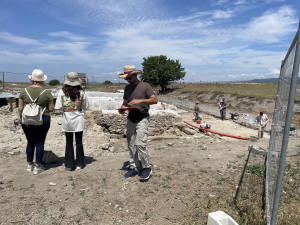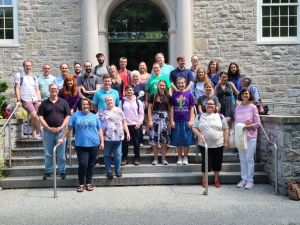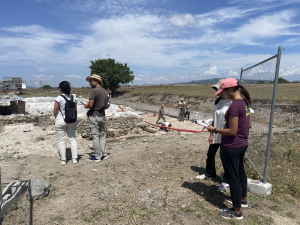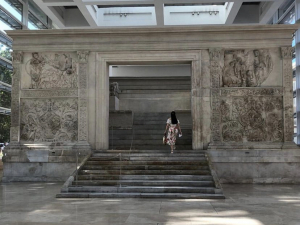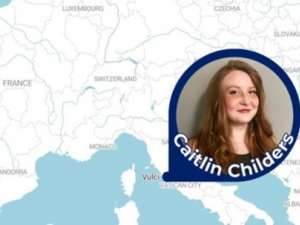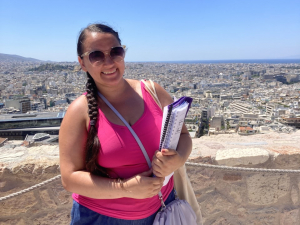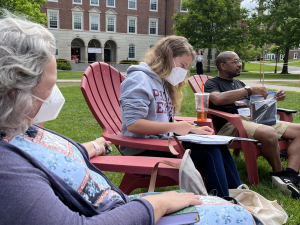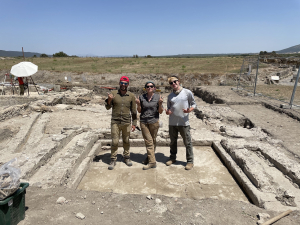Thanks to the generosity of various endowments, the Department of Classical Studies offers research funding to a limited number of Graduate and Undergraduate students. After completing their travel projects, the students are asked to share their experiences. Below are profiles from our past award winners.
A Day in the Life at Pottery Wash featuring area supervisor Hannah During the Summer of 2025, I had the privilege of volunteering with the American School of Classical Studies in Athens’ excavation at the Athenian Agora. During my time as a volunteer, I gained valuable hands-on field experiences, worked closely with ceramic specialists, and made meaningful connections with fellow graduate students. Aside from these experiences in the field, I also became intimately familiar with the… read more about Theresa Cole: Athenian Agora Excavation »
Thanks to the support of the Department, between June 16 and 27 I had the opportunity to attend the two-week online Summer School Digital Tools for Humanists 2025 organized by the Laboratory for Digital Culture at the University of Pisa, Italy. The Summer School was divided into two modules: Working on History for the first week and Working with AI for the second week. It was designed as an introductory course and an intensive exploration of different tools that recent technological… read more about Beatrice Milanesi: Digital Humanities Online Summer School »
In the fall semester of 2022, I read what at the time I thought was the best academic paper on Plato ever written. “‘I Went Down to the Piraeus Yesterday’: Routes, Roads, and Plato’s Republic” (Hesperia Vol. 89 No. 4. Oct-Dec. 2020. 725-755) cracked open Plato’s Republic in a way that I had never before thought possible: asking what route Socrates and Glaucon son of Ariston (and older brother of Plato) had taken from the city to house of Cephalus in the Piraeus in the opening lines… read more about Daniel Orr: People and Places of Greek Philosophy »
Thanks to the CLST Department’s Research Travel Award, I was able to spend a significant portion of my summer in Greece, visiting sites and museums which are central to my dissertation research on migrant women in the ancient Greek world. In particular, the funding made it possible for me to travel and stay in Athens for about 6 weeks, giving me a solid homebase for my work. I was able to hold an Associate Membership at the American School of Classical Studies at Athens, which gave me access to the school’s libraries and… read more about Tara Wells: Analyzing Stelae and Inscriptions in Athens and Delphi »
This summer, with the generous funding from the Classical Studies travel award, I participated in the American Academy in Rome Classical Summer School, which took place from June to July. With the support from this award, I spent over five weeks in Italy, during which I visited many different ancient sites and museums including those in Rome, the Bay of Naples, Tarquinia, and Florence. Under the direction of Dr. Evan Jewell (Rutgers University, Camden), our group explored themes of “wayfinding” in ancient cities, personal… read more about Brooke Braden: Classical Summer School at the American Academy in Rome »
Through the generous funding provided by the Classics Department, I undertook a transformative three-week journey to Greece focused on experiencing ancient Greek as a living linguistic tradition. This immersive experience fundamentally enhanced my understanding of the language's continuity from antiquity to the present day.Mount Athos: Living Ancient GreekMy journey began with four days on Mount Athos, an autonomous monastic republic where Greek serves as the lingua franca among monks from diverse international backgrounds… read more about Jason Murray Jr.: Ancient Greek Language Immersion in Greece »
Translating a spoliated inscription in a church in Mistras This summer, thanks to the generosity of the Duke Department of Classical Studies’ Research Travel Award, I was able to attend the Gennadius Library Medieval Greek Language Summer School, held between July 1 and 28. This intensive program was not only an excellent introduction to medieval Greek in its many forms between the fourth and fourteenth centuries CE, but was also an outstanding overview of medieval Greek literature and… read more about Mina Moon-Black: Gennadius Library Medieval Greek Language Summer School »
I am grateful for the department’s travel funding, which enabled me to conduct dissertation research in Andalucía and to use specialist libraries in Madrid as I write my dissertation on peasant labor and the olive oil industry in Roman Iberia. In the first phase of my summer research, I joined a team from the University of Sevilla in excavating the site of Cerro Macareno, a few miles north of Sevilla. This site is the type site for Pellicer B–C and Pellicer D amphorae, which were used to… read more about Andrew Welser: Archaeological Fieldwork in Spain »
My name is Olivia, and I spent the summer of 2024 in Jackson, Mississippi completing an archeological field school. Asylum Hill is thought to be the largest bioarchaeological site in the United States, with over 6,000 graves lost to time on the grounds of the University of Mississippi Medical Center. These are the bodies of individuals who died at the Mississippi Lunatic Asylum between 1855-1935. Although the graves were once marked with wooden signs, those markers have rotted away, leaving stretches of unbroken, unassuming… read more about Olivia Ares: Archaeological Field School, Jackson, Mississippi »
Thanks to the Classical Studies department’s Research Travel Award, I was able to complete the 2024 Postgraduate Epigraphy Course at the British School at Athens (BSA) in Greece. Dr. Peter Liddel and Dr. Polly Low taught the class, covering all of the need-to-know topics for understanding epigraphy and incorporating it into research, and all over a period of just 10 days. One portion of the program focused on lecture-style sessions for learning about the history of epigraphy, how to work on it, and why it’s important to do… read more about Tara Wells: Postgraduate Epigraphy Course at the British School at Athens »
This summer, I was fortunate enough to participate in the Summer Session at the American School for Classical Studies in Athens with the help of travel funding from Duke’s Department of Classical Studies. The ASCSA Summer Session is a six-week program in which students travel throughout Greece visiting archaeological sites, monuments, and museums from Crete up to Thessaloniki. My nineteen peers and I, under the leadership of Professors Amy C. Smith (University of Reading) and Amelia Brown (University of Queensland), were… read more about Emma Glen: American School for Classical Studies Summer Session »
Anna at Paestum This summer, a research travel award enabled me to participate in the Classical Summer School at the American Academy in Rome. In the program, I spent five weeks living in Rome with a group of graduate students and teachers, visiting museums and archaeological sites in the city and the surrounding area. I was able to have firsthand experience of the aspects of the city’s material culture and architecture I’ve only read about or seen in photographs. Being there in person… read more about Anna Cambron: Roman Life and Material Culture »
Phoenician Graves by the Sea, Cádiz I am very grateful for the department’s travel funding, which enabled me to travel to Spain. I was based in Madrid, where I took intensive Spanish classes and began my doctoral research. I am pleased to say that I was able to progress quickly through the beginning stages of the Spanish language. My ability to read Spanish academic articles, monographs, and other publications increased by leaps and bounds, which will prove fundamental to my future… read more about Andrew Welser: Early Dissertation Research and Language Training in Spain »
Thanks to the generous travel funding provided by the department, in the final weeks of summer 2023, I had the amazing opportunity to participate in an archaeological field school in the Alentejo region of Portugal at a Bronze Age site known as Castelo, under the direction of Bianca Viseu (McMasters University), Rui Mataloto (University of Lisbon), and Gonçalo Bispo (University of Lisbon). Castelo is a large mountain site, only a small portion of which has been uncovered so far. This season, the goal at the site was to… read more about Jess Cruz-Taylor: Archaeological Field School, Redondo, Portugal »
Thanks to the research travel funding from the Classical Studies Department this summer, I was able to conduct research that seamlessly combined my two academic interests of neuroscience and visual studies through the Vulci 3000 Project. As a Neuroscience and Visual Media Studies double major, I had no previous experience in archeology or classical studies, but was able to meaningfully contribute to the initiative through conducting several psychological experiments. Over the course of 2 weeks, my labmates and I were able… read more about Srinjoyi Lahiri: Neurocities and Ruinscapes - Vulci 3000 Project »
The program in which I participated through a grant given by the Classics Department at Duke was called Summer School in Homer. This was a one-week course on all things Homer located in Chios, Greece which is rumored to be the birthplace of Homer (if he did in fact even exist). The course was designed around interpreting Homeric Greek mainly from the Odyssey, and making connections to various themes and works of art from all time periods. We had many lectures covering topics like reception of Homer in ancient philosophers… read more about Aadesh Anchaliya: Homeric Greek in Chios, Greece »
This summer I participated in the Dickinsoniense Conventiculum, which was an immersive spoken Latin experience. The program itself was held at Dickinson College—a small liberal arts college in Carlisle, PA. The Conventiculum was five days long and a true test of the skills I had learned so far at Duke. The program opened with a dinner, which was the last time I spoke English with the participants for the rest of the week. Most of the participants were teachers in high schools near D.C., with me being the only undergraduate… read more about Christian Ellis: Latin Conventiculum-Immersive Spoken Latin »
For summer 2023 I had the opportunity to participate in an excavation at Pompeii, the Pompeii I.14 Project supported by Tulane University and directed by Dr. Allison Emmerson. I joined the project as a ceramics specialist and had a wonderful experience as a member of the project. My work focused on sorting and documenting the many potsherds found on site. It was very rewarding to be able to build on my previous experience working with ceramics as well as gain new knowledge and become deeply familiar with the site’s pottery… read more about Tara Wells: The Pompeii I.14 Project »
With the aid of the Research Travel Award, I was able to travel to Italy this summer to participate in data collection for Dr. Maurizio Forte’s Neurocities and Ruinscapes Bass Connections team, as part of the Vulci 3000 Project. Our work was primarily based in the archeological site at the Etruscan and Roman city of Vulci, though we did additional experiments in Rome. The main goal of the summer work was to collect eye-tracking data using the Pupil Invisible glasses, which will later be used to create a virtual… read more about Sidney Jordan: Neurocities and Ruinscapes Bass Connections Project »
This summer I participated in the Living Latin in Rome organized by Paideia Institute. LLIR is an intensive program conducted almost exclusively in Latin. This year’s theme was Horace’s poetry. In seminar-style daily meetings we read and discussed Horace and the relevant cultural and historical material in Latin. In the afternoon we explored the archaeological sites and museum. These tours—and oftentimes lectures—were also in Latin and included additional readings and activities in Latin. The readings featured a diverse… read more about Mariami Shanshashvili: Horace and Living Latin in Rome »
Hello! I am Caitlin Childers and I’m originally from Gaffney, South Carolina. I’m a first-year Master's student, focusing on Digital Art History. I am spending two weeks as project manager on a Bass Connections project called Neurocities and Ruinscapes. We are at an archaeological site called Vulci in Rome, working on data collection. It’s an Etruscan site, and I’ll be working with my professor, Dr. Maurizio Forte, and two undergrads and learning more about the site itself. My interest in the project is informed by my goal… read more about Caitlin Childers: Neurocities and Ruinscape: Eye Tracking Experiments »
I am grateful for the department’s travel funding, which enabled me to travel to Cyprus for an archaeological excavation, and to go to Turkey to observe important archaeological sites in-person. In Cyprus, I helped investigate Kalavasos Vounaritashi, an Iron-Age site in the middle-south of the Island. This rural site is the first of its kind to be investigated in Cyprus. Our five-person team, led and directed by Dr. Catherine Kearns (Chicago) aimed to uncover another section of the site in order to better understand its use… read more about Andrew Welser: Vasilikos Valley Project »
This summer I participated in the Argilos Excavation, a dig run by the university of Montreal and the Ephoreia of Prehistoric and Classical Antiquities of Serres in Greece. As a field archeologist on this dig, I spent the majority of my time working in my trench with a team of three other undergraduate students and supervisor. On the days that we spent on-site, we spent our time digging in the trench with pickaxes and trowels while also keeping detailed notes of our activities and findings in a log book. We also took daily… read more about Tyler Donovan: Argilos Excavation »
This summer 2022 I was granted a Classical Studies Research Travel Award in support of my participation in a Summer Seminar at the American School of Classical Studies at Athens. Thanks to the generous funding and support of the Teasley Family Student Endowment Fund I was able to take part in an incredible opportunity that made for an educational and enriching summer. The Summer Seminar I attended was focused on the Northern Aegean: Macedon and Thrace, so we spent most of our three weeks together traveling around the… read more about Tara Wells: ASCSA Summer Seminar: The Northern Aegean: Macedon and Thrace »
Thanks to the research travel funding from the Classical Studies Department this summer, I was able to explore both the discipline of archaeology and the history and art of Italy through the Vulci 3000 Project. As an Economics and Art History major, I was virtually completely new to archaeology, but the Trench Supervisors, especially Dani Vander Horst, worked closely with me to teach me the excavation and documentation methods I needed to succeed this summer. I was able to gain an incredible amount of knowledge and new… read more about Skylar Brogan: Vulci 3000 Project »
This summer, I participated in the Exeter Humanities Institute at my alma mater, Phillips Exeter Academy. The weeklong program was dedicated to training educators in Exeter’s famous Harkness Method. The Harkness Method is founded on student led, discussion based learning in all subjects. I worked with humanities educators in all fields, from elementary to college level, to learn how to teach with Harkness. During this week, I was able to experience the Harkness Method from the perspective of both student and teacher. While… read more about Melissa Baroff: Exeter Humanities Institute »
Over the course of the summer, the department’s generous funding allowed me to return for another season to the Vulci 3000 project so that I could attain experience as a Trench Supervisor. This experience was enlightening in many aspects and allowed me to gain a better appreciation for the higher-level decision making processes that occur in archaeological fieldwork and the minute-by-minute interpretative decisions that must be made by supervisors and directors. The Vulci 3000 project is an important source of data within… read more about Danielle Vander Horst: Fieldwork Supervisor Experience »
Thanks to the summer funding provided by this department research travel award, I was able to attend and complete the British School at Rome’s postgraduate course in Roman epigraphy, held in person in Rome, Italy. The course was conducted from July 11th to July 20th, under the direction of Dr. Abigail Graham. The course provided an excellent introduction to the field of Roman epigraphy by taking us students on a series of educational trips throughout Rome, including a day trip to Ostia Antica. Other destinations included… read more about Benjamin Moon-Black: British School at Rome's Postgraduate course in Roman Epigraphy »
I was able to take advantage of several opportunities this summer thanks to the generous funding offered by the department. My summer started off with the Duke in Rome summer study abroad program for which I served as the Teaching Assistant alongside Prof. Gonzalez. It was a truly incredible experience! We brought a fantastic group of Duke undergraduates on the educational adventure of a lifetime, teaching Roman history through the very fabric of the city itself. We also made numerous excursions to visit the most important… read more about Antonio LoPiano: Roman and Etruscan Archaeology »
I am grateful for the departmental funding that enabled me to participate in the Vulci 3000 Archaeological project, led by Dr. Maurizio Forte, for the first time. As a budding Etruscologist, I was excited to continue my studies of Etruscan civilization at such an important site. The tombs of Vulci’s wealthiest citizens yielded some of antiquity’s most heralded painted vases and other artifacts in centuries past, yet the Vulci 3000 project is the first scientific stratigraphical excavation of the city itself. In this season’… read more about Andrew Welser: Vulci 3000 Archaeological Project »















